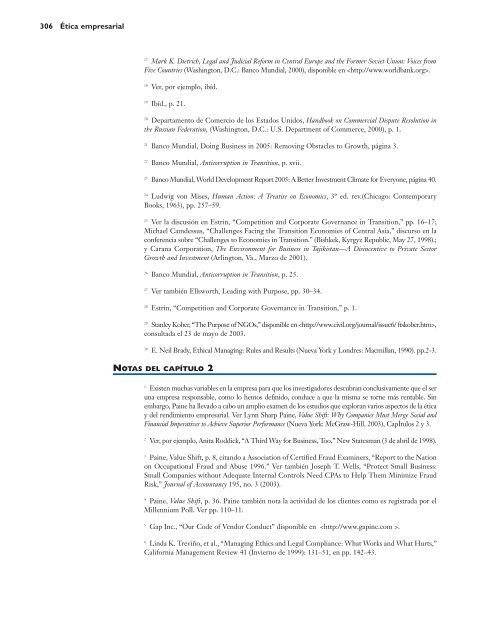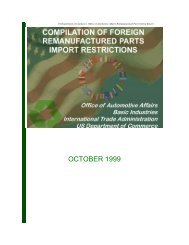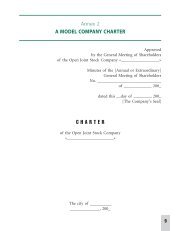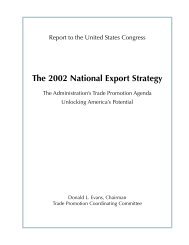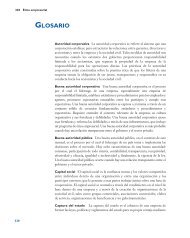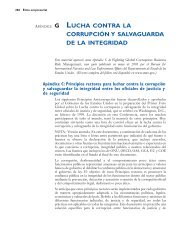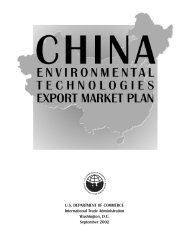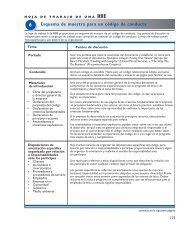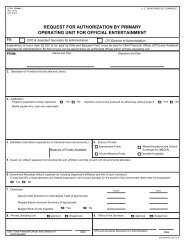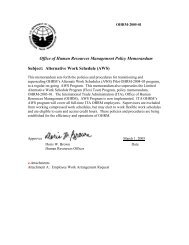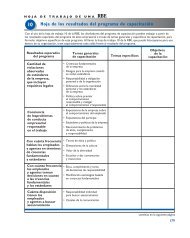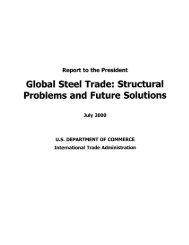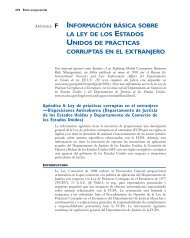Ética comercial - International Trade Administration - Department of ...
Ética comercial - International Trade Administration - Department of ...
Ética comercial - International Trade Administration - Department of ...
Create successful ePaper yourself
Turn your PDF publications into a flip-book with our unique Google optimized e-Paper software.
306 <strong>Ética</strong> empresarial<br />
17<br />
Mark K. Dietrich, Legal and Judicial Reform in Central Europe and the Former Soviet Union: Voices from<br />
Five Countries (Washington, D.C.: Banco Mundial, 2000), disponible en .<br />
18<br />
Ver, por ejemplo, ibíd.<br />
19<br />
Ibíd., p. 21.<br />
20<br />
Departamento de Comercio de los Estados Unidos, Handbook on Commercial Dispute Resolution in<br />
the Russian Federation, (Washington, D.C.: U.S. <strong>Department</strong> <strong>of</strong> Commerce, 2000), p. 1.<br />
21<br />
Banco Mundial, Doing Business in 2005: Removing Obstacles to Growth, página 3.<br />
22<br />
Banco Mundial, Anticorruption in Transition, p. xvii.<br />
23<br />
Banco Mundial, World Development Report 2005: A Better Investment Climate for Everyone, página 40.<br />
24<br />
Ludwig von Mises, Human Action: A Treatise on Economics, 3º ed. rev.(Chicago: Contemporary<br />
Books, 1963), pp. 257–59.<br />
25<br />
Ver la discusión en Estrin, “Competition and Corporate Governance in Transition,” pp. 16–17;<br />
Michael Camdessus, “Challenges Facing the Transition Economies <strong>of</strong> Central Asia,” discurso en la<br />
conferencia sobre “Challenges to Economies in Transition.” (Bishkek, Kyrgyz Republic, May 27, 1998).;<br />
y Carana Corporation, The Environment for Business in Tajikistan—A Disincentive to Private Sector<br />
Growth and Investment (Arlington, Va., Marzo de 2001).<br />
26<br />
Banco Mundial, Anticorruption in Transition, p. 25.<br />
27<br />
Ver también Ellsworth, Leading with Purpose, pp. 30–34.<br />
28<br />
Estrin, “Competition and Corporate Governance in Transition,” p. 1.<br />
29<br />
Stanley Kober, “The Purpose <strong>of</strong> NGOs,” disponible en ,<br />
consultada el 23 de mayo de 2003.<br />
30<br />
E. Neil Brady, Ethical Managing: Rules and Results (Nueva York y Londres: Macmillan, 1990). pp.2-3.<br />
NOTAS DEL CAPÍTULO 2<br />
1<br />
Existen muchas variables en la empresa para que los investigadores descubran conclusivamente que el ser<br />
una empresa responsable, como lo hemos definido, conduce a que la misma se torne más rentable. Sin<br />
embargo, Paine ha llevado a cabo un amplio examen de los estudios que exploran varios aspectos de la ética<br />
y del rendimiento empresarial. Ver Lynn Sharp Paine, Value Shift: Why Companies Must Merge Social and<br />
Financial Imperatives to Achieve Superior Performance (Nueva York: McGraw-Hill, 2003), CapÍtulos 2 y 3.<br />
2<br />
Ver, por ejemplo, Anita Roddick, “A Third Way for Business, Too,” New Statesman (3 de abril de 1998).<br />
3<br />
Paine, Value Shift, p. 8, citando a Association <strong>of</strong> Certified Fraud Examiners, “Report to the Nation<br />
on Occupational Fraud and Abuse 1996.” Ver también Joseph T. Wells, “Protect Small Business:<br />
Small Companies without Adequate Internal Controls Need CPAs to Help Them Minimize Fraud<br />
Risk,” Journal <strong>of</strong> Accountancy 195, no. 3 (2003).<br />
4<br />
Paine, Value Shift, p. 36. Paine también nota la actividad de los clientes como es registrada por el<br />
Millennium Poll. Ver pp. 110–11.<br />
5<br />
Gap Inc., “Our Code <strong>of</strong> Vendor Conduct” disponible en .<br />
6<br />
Linda K. Treviño, et al., “Managing Ethics and Legal Compliance: What Works and What Hurts,”<br />
California Management Review 41 (Invierno de 1999): 131–51, en pp. 142–43.


